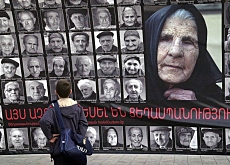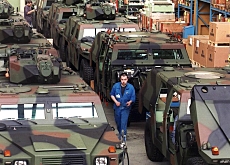Ambassador reflects on Swiss-Turkish relations

Ahead of a visit by Turkish parliamentarians to Switzerland, Ankara’s ambassador in Bern, Alev Kiliç, spoke to swissinfo about relations between the two countries.
The foreign affairs committee of the Turkish Grand National Assembly begins a weeklong visit to Switzerland on Monday.
“Swiss-Turkish relations have always been characterised by a good mutual understanding,” Kiliç says with unsurprising diplomacy.
“Switzerland plays a very prominent role in Turkish history – the treaty establishing Turkey as a republic was signed in Lausanne in 1923 – so we’ve enjoyed diplomatic relations for 80 years or so.”
Five Turkish politicians are paying a reciprocal visit to Switzerland, following a trip by a Swiss foreign affairs committee to Turkey last year.
Such visits, says Kiliç, “lead to a better understanding on a people-to-people level because the parliamentarians reflect public sentiments and when they return home they relay their impressions to their constituencies”.
The ambassador says economic relations have always been a strong aspect of the countries’ bilateral relations. “Foreign minister Calmy-Rey’s visit to Ankara a few months ago was seen on both sides as a gate opener for further deepening of relations.
“We’re now working on a visit of the economics minister, Mr Deiss, to Turkey as early as this autumn,” he says.
Armenian question
Inevitably talk of Swiss-Turkish relations turns to the “Armenian question”, namely disagreement over whether the massacre of 1915-18 constituted genocide. Armenians say the Ottoman Empire murdered 1,800,000 of their people; the Turks the numbers were much less and put the emphasis on the killings on both sides.
The general pattern is just as everything seems to be going well – agreements on imports and exports, for example – something happens regarding the Armenian issue that undoes all the good diplomatic work.
When canton Vaud’s parliament voted to recognise the Armenian massacre as genocide, Ankara withdrew an invitation to Micheline Calmy-Rey to visit Turkey in September 2003.
A similar vote by the House of Representatives three months later drew fresh condemnation from Turkey.
Bitter taste
“Yes, [the Armenian situation] has left a bitter taste at a certain point in our relations,” Kiliç admits. “But we would like to clear this once and for all by establishing a commission of historians from both sides and opening all files and archives.”
Kiliç says during Calmy-Rey’s visit to Turkey in March, the Turkish foreign minister Abdullah Gül told the Swiss about such a commission and they showed interest.
“I think the Swiss agree with this approach and understand this difficulty. Again, we are on a ground of mutual understanding on this.
“But of course the proposal has also been made to the Armenian government and we can’t establish anything without their agreement. We have still not received a positive reply.”
Europe
Turkey’s main priority in Europe is accession talks with the European Union. So does Kiliç think Ankara’s new friends in Brussels will mean less time for old friends in Bern?
Kiliç sees plenty of room for closer relations between Bern and Ankara. “I’ve been here about six months and my view [is] that we haven’t been able to exploit our potential fully.
“The main challenge now in Swiss-Turkish relations is how to fully tap that potential – then we can look back and regret why we didn’t do it sooner!”
swissinfo, Thomas Stephens
The treaty marking the birth of modern Turkey was signed in Lausanne on July 24, 1923.
Armenians say 1.8 million of their people were killed or deported from 1915-18 by the Ottoman Empire.
Turkey disputes this, saying the numbers were much less and there were killings on both sides.
In 2004, Swiss exports to Turkey were worth SFr1.9 billion ($1.5 billion), 17% more than in 2003.
Turkey is set to start accession talks with the European Union on October 3 – the negotiations are expected to take ten years.

In compliance with the JTI standards
More: SWI swissinfo.ch certified by the Journalism Trust Initiative













You can find an overview of ongoing debates with our journalists here . Please join us!
If you want to start a conversation about a topic raised in this article or want to report factual errors, email us at english@swissinfo.ch.